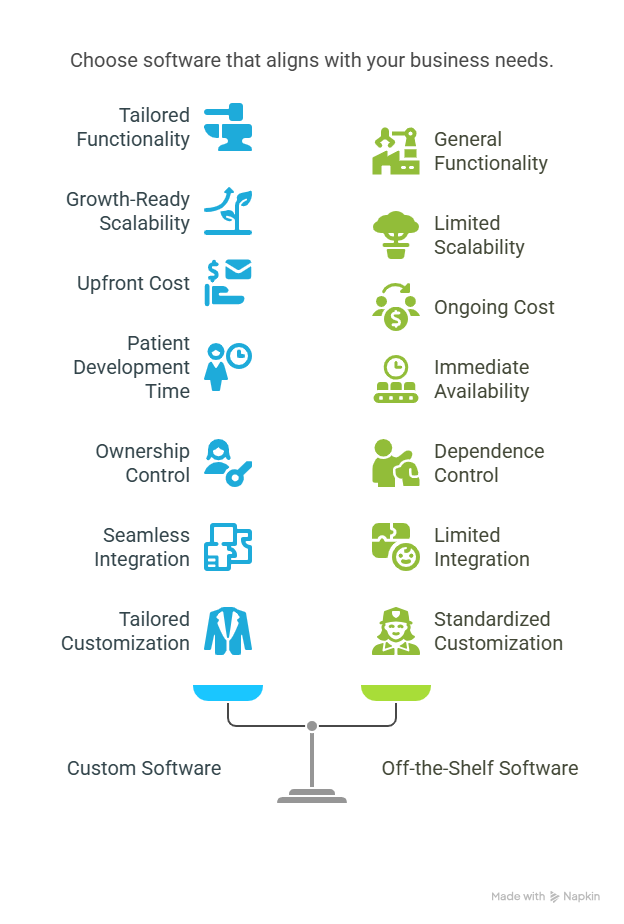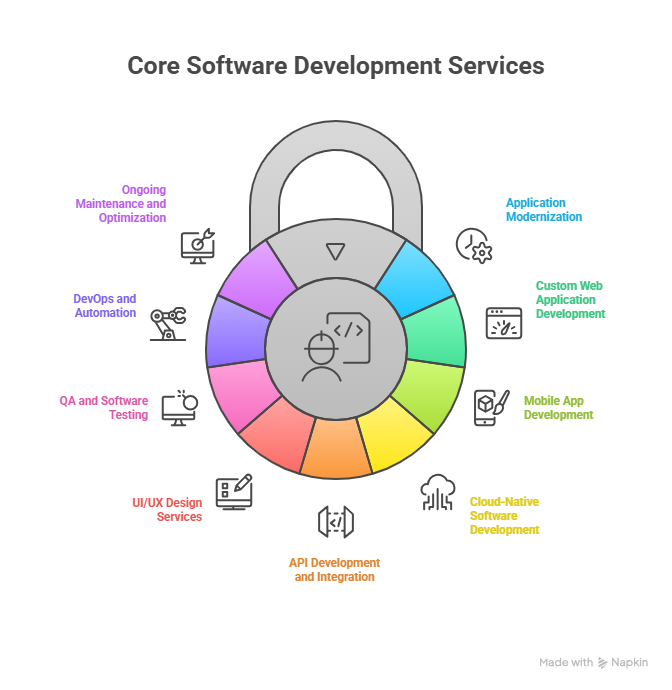Let’s say you’re running a business that’s growing fast, but the tools you’re using weren’t built for how you operate. Maybe your team is juggling manual workarounds, your systems don’t sync, or you’re relying on five different apps to complete one task. Sound familiar? There is an easy fix to this: custom software development services.
Maybe your team is stuck with tools that don’t talk to each other. Maybe you’re relying on spreadsheets when you should be automating workflows. Or maybe you’re launching something new and need to build it from the ground up.
Whatever the case, you’re here because you have a job to get done, and you’re trying to figure out which services will help you do it. In this blog, I’ll walk you through the most valuable custom software development services available right now. I’ll also share what to look for in a software development company so you don’t waste time (or money) building the wrong thing.
Let’s get started.
What Are Custom Software Development Services?
At their core, custom software development services help you build software that’s designed specifically for your business. Instead of adjusting your workflows to fit someone else’s platform, you get a system that works the way you do, right out of the gate.
These services cover everything from:
- Planning what the software should do
- Designing how it should look and feel
- Writing the code
- Connecting it with your existing tools
- Testing and launching
- And maintaining it as your business grows
The goal? To solve business problems with software that actually fits your needs, whether it’s automating internal operations, improving customer experience, or launching a product your industry hasn’t seen before.
Custom Software vs. Off-the-Shelf Software: A Quick Comparison

If your business is facing unique challenges or trying to do something your competitors aren’t, custom development gives you the freedom to build exactly what you need, nothing more, nothing less.
Is Custom Software Development Right for You?
Before investing in anything, it’s smart to ask: Do I actually need custom software, or will something off-the-shelf work for now?
Here’s how I help clients figure that out.
| Custom Software Is a Good Fit If You… | You Might Not Need It If You… |
| Use multiple tools that don’t integrate | Have simple workflows that fit into existing tools |
| Have outgrown off-the-shelf software | Are just starting out or testing an idea |
| Need features no platform offers | Can adapt your business process to existing software |
| Want full control over data, features, and roadmap | Don’t need customization or long-term scalability (yet) |
| Operate in a regulated or high-security industry | Don’t have any industry-specific compliance requirements |
In short: custom software development isn’t for every company; it’s for businesses that are past the basics and need a solution that fits them precisely.
If you’re unsure, a good software development company won’t just say “yes” to everything; they’ll help you evaluate whether custom is the right call or not.
Top Custom Software Development Services You Should Know

Custom software isn’t a single service; it’s a combination of capabilities that solve different types of problems. Here are the core custom software development services I recommend to clients looking to grow faster, work smarter, or build something new from the ground up.
1. Application Modernization
What it is: Updating and rebuilding legacy systems using modern architecture and technologies.
When to use it: You rely on old software that’s slowing you down or doesn’t scale.
Why it matters: You avoid starting from scratch while giving your system the performance, security, and flexibility it needs to support growth.
2. Custom Web Application Development
What it is: Building browser-based applications that handle core business operations.
When to use it: You need centralized tools for teams, customers, or vendors to work more efficiently.
Why it matters: A custom web app gives you full control over features, workflows, and integrations, and can be accessed anywhere.
3. Mobile App Development
What it is: Creating native or cross-platform apps for mobile-first use cases.
When to use it: Your users (or internal teams) need fast, reliable mobile access to features or data.
Why it matters: A well-built mobile app improves usability, customer engagement, and productivity in the field.
4. Cloud-Native Software Development
What it is: Designing software specifically for cloud environments like AWS, Azure, or GCP.
When to use it: You want a system that’s scalable, globally accessible, and cost-efficient.
Why it matters: Cloud-native apps reduce infrastructure overhead and allow faster deployments as your needs change.
5. API Development and Integration
What it is: Building secure interfaces that connect your internal systems or external tools.
When to use it: Your team is duplicating data across platforms or switching between disconnected systems.
Why it matters: APIs streamline operations, improve data accuracy, and let your tech stack work together as one.
6. UI/UX Design Services
What it is: Designing interfaces and user flows (UI/UX development) for clarity, usability, and performance.
When to use it: Users struggle to use your software or adoption is low.
Why it matters: Good design improves engagement, reduces training time, and leads to better long-term ROI.
7. QA and Software Testing
What it is: Systematically testing your software to find bugs, security gaps, and performance issues.
When to use it: Before any launch, or after one that didn’t go as planned.
Why it matters: Solid QA prevents failures in production and protects your brand from avoidable downtime.
8. DevOps and Automation
What it is: Automating development, deployment, and infrastructure management.
When to use it: Your delivery process is slow, error-prone, or hard to scale.
Why it matters: DevOps helps you release better software faster, with fewer bugs and more consistency.
9. Ongoing Maintenance and Optimization
What it is: Continuous updates, fixes, and performance tuning after your software goes live.
When to use it: Always.
Why it matters: Software that doesn’t evolve quickly becomes a liability. Support ensures it stays fast, secure, and useful.
Why Work With a Custom Software Development Company and How to Choose the Right One
You can hire freelancers, build in-house, or try to patch things together with no-code tools, but if your goal is long-term scalability and reliability, working with a seasoned custom software development company is often the better choice.
Here’s why.
Why It Makes Sense to Work With a Custom Software Development Company
1. You get a full team, not just a developer
Custom software requires strategy, design, development, testing, and support. A company brings specialists for every part of the process, so nothing gets overlooked.
2. They’ve done it before
Experienced teams bring real-world knowledge from other projects. They know what works, what breaks, and how to avoid problems you haven’t even thought about yet.
3. They build for scale, not just launch
A good software development company doesn’t just get you to MVP; they build foundations that hold up as your user base and feature set grow.
4. You stay focused on your business
You don’t have to manage multiple freelancers or hire an internal team from scratch. You stay focused on growth, while they focus on building the right solution.
How to Choose the Right Custom Software Development Company
Picking the right partner is just as important as picking the right services. Here’s what I recommend looking for:
Relevant experience
Ask for real examples, not just portfolios. Have they built products in your industry or with similar complexity?
Clarity in process
They should walk you through their development process, from discovery to deployment to support. If they can’t explain it clearly, that’s a red flag.
Technical depth
Make sure they can work with the stack you need, whether that’s cloud-native apps, secure APIs, mobile-first platforms, or AI-powered modules.
Transparent pricing
Good companies give you clear estimates with scope, timelines, and options. Be cautious of teams that only sell you on hourly rates or vague packages.
Long-term mindset
Do they offer maintenance? Will they be around when you need to scale or troubleshoot later? A good partner doesn’t disappear after launch.
Working with the right team means fewer surprises, faster delivery, and better outcomes. And if you’re planning to build something custom, you deserve more than code. You deserve a partner that understands your business and builds like they’re part of it.
Ready to Scale With the Right Software?
If you’ve made it this far, you already know this: scaling in 2026 takes more than off-the-shelf tools and patched-together systems. You need software that fits your business, not the other way around.
Custom software development services help you get there. They give you control, flexibility, and the ability to move at your own pace, not your software vendor’s.
The key is choosing the right services for your needs, and the right software development company to build them. Look for a partner who understands your business, brings real technical depth, and sticks with you beyond launch.
At WildnetEdge, we help businesses scale with purpose-built software, designed to fit now and built to flex with what’s next. Whether you need a full product team or targeted expertise, we’re here to help.
Let’s talk about what you need and build it the right way.
FAQs
- Is custom software only for large enterprises?
Not at all. Many small and mid-sized businesses invest in custom software when they outgrow generic tools or need systems that better support their growth. The key is aligning the investment with a clear business case and working with a team that knows how to build smart, scalable solutions.
- How long does it take to build custom software?
It depends on what you’re building. A basic internal system might take 2–3 months, while a complex platform could take 6–12 months or more. The timeline also depends on how clear your requirements are and how many features you need.
- What kind of support do I need after launch?
Post-launch support includes bug fixes, updates, performance monitoring, and feature enhancements. Software is a living system — it should evolve with your business. A good development partner will plan for this from day one.

Nitin Agarwal is a veteran in custom software development. He is fascinated by how software can turn ideas into real-world solutions. With extensive experience designing scalable and efficient systems, he focuses on creating software that delivers tangible results. Nitin enjoys exploring emerging technologies, taking on challenging projects, and mentoring teams to bring ideas to life. He believes that good software is not just about code; it’s about understanding problems and creating value for users. For him, great software combines thoughtful design, clever engineering, and a clear understanding of the problems it’s meant to solve.
 sales@wildnetedge.com
sales@wildnetedge.com +1 (212) 901 8616
+1 (212) 901 8616 +1 (437) 225-7733
+1 (437) 225-7733















 ChatGPT Development & Enablement
ChatGPT Development & Enablement Hire AI & ChatGPT Experts
Hire AI & ChatGPT Experts ChatGPT Apps by Industry
ChatGPT Apps by Industry ChatGPT Blog
ChatGPT Blog ChatGPT Case study
ChatGPT Case study AI Development Services
AI Development Services Industry AI Solutions
Industry AI Solutions AI Consulting & Research
AI Consulting & Research Automation & Intelligence
Automation & Intelligence















